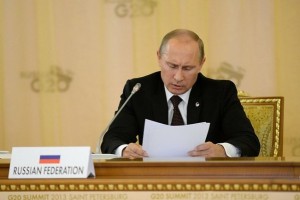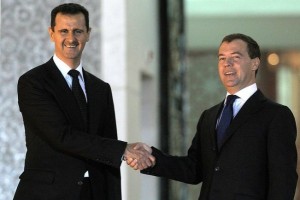
Russian President Putin at the G20 Summit.
Yesterday in the New York Times, Russian President Vladamir Putin published an op-ed in response to the evolving situation in Syria. This attempt at public diplomacy represented a rather deaf attempt to influence Americans to support the Russian narrative on Syria. It comes off as the equivalent of a touchdown dance before the ball has made it to the end-zone at an away-game.
Let’s take a look at Mr. Putin’s words.
At first, Putin opens with an appeal to the American public, coming off as reasonable, genuine, and respectable in his desire to improve relations between the U.S. and Russia:
RECENT events surrounding Syria have prompted me to speak directly to the American people and their political leaders. It is important to do so at a time of insufficient communication between our societies.
He then makes a nostalgic appeal for American and Russian cooperation, though acknowledging the two nations have certainly faced their relational difficulties:
Relations between us have passed through different stages. We stood against each other during the cold war. But we were also allies once, and defeated the Nazis together. The universal international organization — the United Nations — was then established to prevent such devastation from ever happening again.
After which, he appeals to desires by many in the American public to make sure the international community is onboard with whatever action is taken, and references America’s role in the creation of the United Nations at the end of WWII:
The United Nations’ founders understood that decisions affecting war and peace should happen only by consensus, and with America’s consent the veto by Security Council permanent members was enshrined in the United Nations Charter. The profound wisdom of this has underpinned the stability of international relations for decades.
And concludes with a common criticism of the United Nations that resonates with a large portion of the American public, who often voice cynicism over the UN’s ability to act and enforce:
No one wants the United Nations to suffer the fate of the League of Nations, which collapsed because it lacked real leverage.
Additionally, Putin includes arguments based on the American concern that Al Qaeda affiliated groups comprise the Syrian opposition, and elements of concern about whether U.S. involvement in Iraq, Afghanistan, and Libya have produced the results they were intended to.

Then Russian President Medvedev meets Assad in Syria in 2010.
But when it comes to reasonableness, that’s where it ends.
As many scholars and practitioners of public diplomacy contend, listening is key. Putin’s tone, style, and arguments demonstrates a fundamental failure to listen to the full discourse of the American public. He fails to understand American criticism of the international community, and how Americans see their role and the role of Russia in the world.
Commenting on how the UN could potentially fail to remain a viable institution, Putin attempts to reverse a long-established American perception about why the UN is sometimes ineffective. While many Americans would place “blame” for the UN’s failure to address a variety of challenges on Russia or Chinese “obstructionism” (veto power), Putin instead argues that ineffectiveness is predicated more on U.S. willingness to act outside the bounds of the Security Council. He contends that failure of the UN along the lines of the League of nations:
…is possible if influential countries bypass the United Nations and take military action without Security Council authorization.
Putin then argues the exact opposite of what Americans perceive of Russia’s role in the Syrian conflict—that Russia is supporting the Assad regime and enabling its slaughter of civilians with military hardware—and cloaks this action under the guise of support for international law:
From the outset, Russia has advocated peaceful dialogue enabling Syrians to develop a compromise plan for their own future. We are not protecting the Syrian government, but international law.
In an attempt to appeal to a common American sentiment that the U.S. is not the “world’s policeman,” Putin fails to address that Russia’s direct support for the Assad regime also qualifies as intervention, and instead argues:
It is alarming that military intervention in internal conflicts in foreign countries has become commonplace for the United States. Is it in America’s long-term interest? I doubt it.
As Russia is actively trying to portray itself as a bastion of soft power and as responsible, modern country on the international scene, one has to consider the “long-term” consequences that supporting the Assad regime has for its soft power. Though the internet quickly erupted in memes touting Putin as a newfound peacemaker, this small bubble of short-term admiration is unlikely to have lasting impact without a fundamental behavioral change by Putin.
He continues to mis-message his target audience by ignoring Assad’s atrocities and Russia’s rather flagrant human rights violations at home, and chooses instead to insult American democracy:
Millions around the world increasingly see America not as a model of democracy but as relying solely on brute force, cobbling coalitions together under the slogan “you’re either with us or against us.”
Putin then completely discounts the possibility that the Syrian government, as the only confirmed actor in the country in ownership of chemical weapons and capability to deploy them, could be held responsible for the use of those weapons. He places the blame squarely on the opposition and alleges a disinformation campaign:
No one doubts that poison gas was used in Syria. But there is every reason to believe it was used not by the Syrian Army, but by opposition forces, to provoke intervention by their powerful foreign patrons, who would be siding with the fundamentalists.
In closing his remarks, Putin made the fatal error of criticizing the notion of American exceptionalism—a point that is almost certain to alienate a large majority of the American public. While perhaps appealing conceptually to other international or domestic Russian audiences, directly criticizing notions of American pride is not a technique that is likely to win followers, friends or influence in the United States:
And I would rather disagree with a case he made on American exceptionalism, stating that the United States’ policy is “what makes America different. It’s what makes us exceptional.” It is extremely dangerous to encourage people to see themselves as exceptional, whatever the motivation.
Concluding…
This of course is not Putin’s only attempt at reaching out directly to international publics. Some may recall his recent English language video appeal to host the 2020 World Expo, which while not unprecedented for Putin, comes off as incredibly awkward.
In the end, even without the insulting rhetoric, Putin’s op-ed represents a perfect example of the idea that the message one sends doesn’t matter nearly as much as the message received. Russia can try to paint any narrative it wants about what’s going on in Syria, but so long as it bolsters Assad on the international scene, its actions will matter more than its words. Even though Putin made some points that are sure to appeal to the American public, his focus on trying to criticize the U.S., and being dishonest about the Russian role in the conflict completely deflates his arguments.
Though the plan Russia has proposed for removing Syria’s chemical weapons appears to be a constructive move, it appears that the Russians will have to do much more than make proposals and write op-eds to change the current climate of stigma much of the American public assigns to the Russian Government. And with the Sochi Olympics coming up, action to reverse that stigma matters.
The post Putin’s Op-ed on Syria: Public Diplomacy without Listening appeared first on American Security Project.


